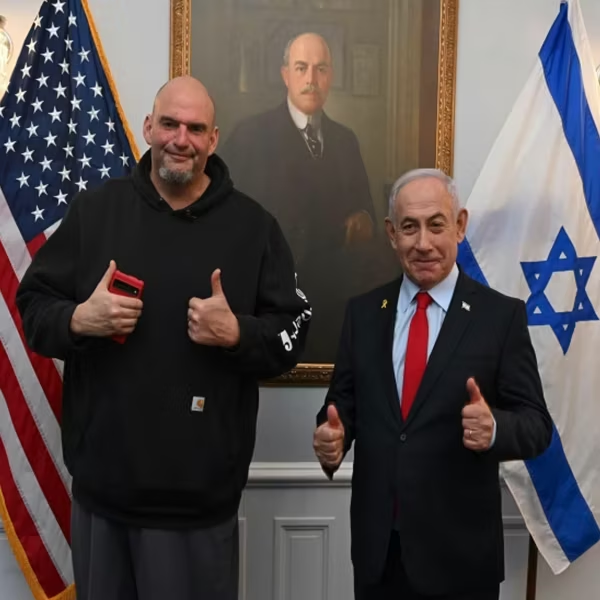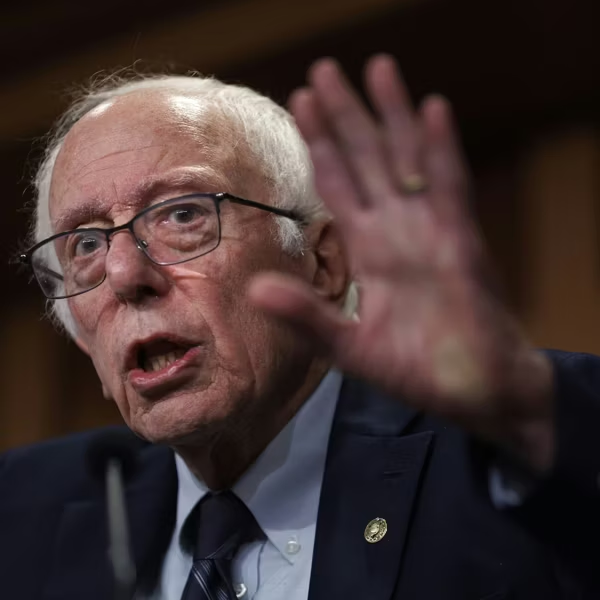Israel's Senior Politicians and Security Service Snub Carter Visit
Jimmy Carter faced a cold reception in Israel yesterday where senior political leaders avoided meeting him and the Israeli secret service declined to help the American agents guarding him.The former US president was at the start of a Middle East tour, in which he is expected to meet on Friday the exiled head of the Palestinian Islamist group Hamas, Khaled Meshal. The proposed meeting has brought criticism in Israel.
On Sunday, Carter met the Israeli president, Shimon Peres, who told him that meeting Meshal was "a very big mistake". He has no meetings scheduled with Israel's prime minister, Ehud Olmert, or foreign and defence ministers. Carter will meet the trade and industry minister. Asked about the lack of high-level meetings, he told Israel's Ha'aretz newspaper: "I'm disappointed but not distressed."
The Israeli security service Shin Bet declined to meet the head of Carter's US secret service detail or provide assistance. One US source told Reuters the snub was "unprecedented". An Israeli security source told the news agency no request for help had been made, though Carter's delegation insisted it had. The authorities also refused permission for him to meet Marwan Barghouti, a popular Palestinian activist regarded by some as a future leader, who is in an Israeli jail for murder.
The reception given to Carter, who helped negotiate 1979's Camp David peace accords between Israel and Egypt, is unusual and stems not only from his proposed meeting with the Hamas leader but also from the anger caused within Israel by his 2006 book, Palestine: Peace not Apartheid. It was not the book's criticisms of the Israeli occupation that created controversy; it was that such a senior US political figure had questioned Israeli policy.
Carter has held other meetings on his Israeli visit, including with the parents of an Israeli soldier captured near Gaza two years ago and with Yossi Beilin, a leftwing politician. Yesterday, Carter travelled to Sderot, a southern Israeli town frequently targeted by rockets fired by militants in Gaza. "I think it's a despicable crime for any deliberate effort to be made to kill innocent civilians, and my hope is there will be a ceasefire soon," Carter said.
In the meeting with Meshal, Carter says he intends to test the Hamas leader's support for the Arab peace initiative, a Saudi proposal under which the Arab world would give Israel diplomatic recognition in return for a Palestinian state in the West Bank and Gaza Strip. Although Israel has not rejected the proposal, it has not embraced it either and continues to refuse to talk to Hamas, which won the Palestinian election two years ago.
"I think there's no doubt in anyone's mind that if Israel is ever going to find peace with justice concerning the relationship with its next-door neighbours, the Palestinians, Hamas will have to be included in the process," Carter told the US television network ABC News.
In an interview this month with the Palestinian newspaper al-Ayyam, Meshal appeared to accept a two-state solution, though he refused to recognise Israel. He talked of a return to the 2006 Prisoners' Document, in which Hamas agreed that Mahmoud Abbas, the Palestinian president and leader of rivals Fatah, should be in charge of negotiations with Israel.
(c) 2008 The Guardian
An Urgent Message From Our Co-Founder
Dear Common Dreams reader, The U.S. is on a fast track to authoritarianism like nothing I've ever seen. Meanwhile, corporate news outlets are utterly capitulating to Trump, twisting their coverage to avoid drawing his ire while lining up to stuff cash in his pockets. That's why I believe that Common Dreams is doing the best and most consequential reporting that we've ever done. Our small but mighty team is a progressive reporting powerhouse, covering the news every day that the corporate media never will. Our mission has always been simple: To inform. To inspire. And to ignite change for the common good. Now here's the key piece that I want all our readers to understand: None of this would be possible without your financial support. That's not just some fundraising cliche. It's the absolute and literal truth. We don't accept corporate advertising and never will. We don't have a paywall because we don't think people should be blocked from critical news based on their ability to pay. Everything we do is funded by the donations of readers like you. Will you donate now to help power the nonprofit, independent reporting of Common Dreams? Thank you for being a vital member of our community. Together, we can keep independent journalism alive when it’s needed most. - Craig Brown, Co-founder |
Jimmy Carter faced a cold reception in Israel yesterday where senior political leaders avoided meeting him and the Israeli secret service declined to help the American agents guarding him.The former US president was at the start of a Middle East tour, in which he is expected to meet on Friday the exiled head of the Palestinian Islamist group Hamas, Khaled Meshal. The proposed meeting has brought criticism in Israel.
On Sunday, Carter met the Israeli president, Shimon Peres, who told him that meeting Meshal was "a very big mistake". He has no meetings scheduled with Israel's prime minister, Ehud Olmert, or foreign and defence ministers. Carter will meet the trade and industry minister. Asked about the lack of high-level meetings, he told Israel's Ha'aretz newspaper: "I'm disappointed but not distressed."
The Israeli security service Shin Bet declined to meet the head of Carter's US secret service detail or provide assistance. One US source told Reuters the snub was "unprecedented". An Israeli security source told the news agency no request for help had been made, though Carter's delegation insisted it had. The authorities also refused permission for him to meet Marwan Barghouti, a popular Palestinian activist regarded by some as a future leader, who is in an Israeli jail for murder.
The reception given to Carter, who helped negotiate 1979's Camp David peace accords between Israel and Egypt, is unusual and stems not only from his proposed meeting with the Hamas leader but also from the anger caused within Israel by his 2006 book, Palestine: Peace not Apartheid. It was not the book's criticisms of the Israeli occupation that created controversy; it was that such a senior US political figure had questioned Israeli policy.
Carter has held other meetings on his Israeli visit, including with the parents of an Israeli soldier captured near Gaza two years ago and with Yossi Beilin, a leftwing politician. Yesterday, Carter travelled to Sderot, a southern Israeli town frequently targeted by rockets fired by militants in Gaza. "I think it's a despicable crime for any deliberate effort to be made to kill innocent civilians, and my hope is there will be a ceasefire soon," Carter said.
In the meeting with Meshal, Carter says he intends to test the Hamas leader's support for the Arab peace initiative, a Saudi proposal under which the Arab world would give Israel diplomatic recognition in return for a Palestinian state in the West Bank and Gaza Strip. Although Israel has not rejected the proposal, it has not embraced it either and continues to refuse to talk to Hamas, which won the Palestinian election two years ago.
"I think there's no doubt in anyone's mind that if Israel is ever going to find peace with justice concerning the relationship with its next-door neighbours, the Palestinians, Hamas will have to be included in the process," Carter told the US television network ABC News.
In an interview this month with the Palestinian newspaper al-Ayyam, Meshal appeared to accept a two-state solution, though he refused to recognise Israel. He talked of a return to the 2006 Prisoners' Document, in which Hamas agreed that Mahmoud Abbas, the Palestinian president and leader of rivals Fatah, should be in charge of negotiations with Israel.
(c) 2008 The Guardian
Jimmy Carter faced a cold reception in Israel yesterday where senior political leaders avoided meeting him and the Israeli secret service declined to help the American agents guarding him.The former US president was at the start of a Middle East tour, in which he is expected to meet on Friday the exiled head of the Palestinian Islamist group Hamas, Khaled Meshal. The proposed meeting has brought criticism in Israel.
On Sunday, Carter met the Israeli president, Shimon Peres, who told him that meeting Meshal was "a very big mistake". He has no meetings scheduled with Israel's prime minister, Ehud Olmert, or foreign and defence ministers. Carter will meet the trade and industry minister. Asked about the lack of high-level meetings, he told Israel's Ha'aretz newspaper: "I'm disappointed but not distressed."
The Israeli security service Shin Bet declined to meet the head of Carter's US secret service detail or provide assistance. One US source told Reuters the snub was "unprecedented". An Israeli security source told the news agency no request for help had been made, though Carter's delegation insisted it had. The authorities also refused permission for him to meet Marwan Barghouti, a popular Palestinian activist regarded by some as a future leader, who is in an Israeli jail for murder.
The reception given to Carter, who helped negotiate 1979's Camp David peace accords between Israel and Egypt, is unusual and stems not only from his proposed meeting with the Hamas leader but also from the anger caused within Israel by his 2006 book, Palestine: Peace not Apartheid. It was not the book's criticisms of the Israeli occupation that created controversy; it was that such a senior US political figure had questioned Israeli policy.
Carter has held other meetings on his Israeli visit, including with the parents of an Israeli soldier captured near Gaza two years ago and with Yossi Beilin, a leftwing politician. Yesterday, Carter travelled to Sderot, a southern Israeli town frequently targeted by rockets fired by militants in Gaza. "I think it's a despicable crime for any deliberate effort to be made to kill innocent civilians, and my hope is there will be a ceasefire soon," Carter said.
In the meeting with Meshal, Carter says he intends to test the Hamas leader's support for the Arab peace initiative, a Saudi proposal under which the Arab world would give Israel diplomatic recognition in return for a Palestinian state in the West Bank and Gaza Strip. Although Israel has not rejected the proposal, it has not embraced it either and continues to refuse to talk to Hamas, which won the Palestinian election two years ago.
"I think there's no doubt in anyone's mind that if Israel is ever going to find peace with justice concerning the relationship with its next-door neighbours, the Palestinians, Hamas will have to be included in the process," Carter told the US television network ABC News.
In an interview this month with the Palestinian newspaper al-Ayyam, Meshal appeared to accept a two-state solution, though he refused to recognise Israel. He talked of a return to the 2006 Prisoners' Document, in which Hamas agreed that Mahmoud Abbas, the Palestinian president and leader of rivals Fatah, should be in charge of negotiations with Israel.
(c) 2008 The Guardian

